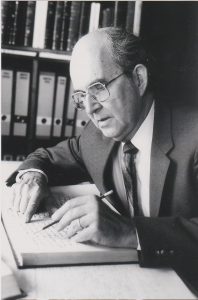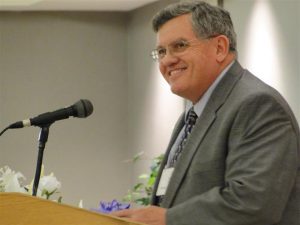Why would the work of Dr. Kenneth Bailey ’55, who died nearly 10 years ago and retired 20 years earlier, matter today? The title of this year’s W. Don McClure Lecture, “The Life and Thought of Presbyterian Missionary and New Testament Scholar Kenneth E. Bailey,” points to two answers. As a scholar, Bailey produced a seminal work reconnecting the New Testament to its Middle Eastern context: Jesus Through Middle Eastern Eyes: Cultural Studies in the Gospels. However, he could not have accomplished this incredible work of scholarship without his 40 years of experience as a missionary in Egypt and the Middle East.
Bailey’s combined missionary-and-scholar perspective led him to wrestle with questions regarding Western missional “vocations” to people of other faiths. Such questions—assessing the nature of “mission” and reexamining interpretations of the New Testament in light of the cultural context in which it was written—remain important topics of conversation in the Western churches today.
A Lifelong Missionary’s Unique Insights Into the New Testament

Former PTS New Testament professor Dr. James Walther (who with Professor William Orr wrote a very important commentary on I Corinthians) once told Kenneth Bailey, “Don’t worry about your work not being recognized. You will be important 50 year after you die.” He explained that Dr. Bailey was not noticed because he was fluent in Arabic and had a working knowledge of Aramaic and Syriac—ancient Middle Eastern languages essential to understanding the earliest Christian literature. While it was common for serious New Testament scholars like Bailey to work in Greek, Hebrew, and Latin (and probably German or French), almost no one in the field knew these Middle Eastern languages. Consequently, Bailey’s fellow scholars would not be able to engage his unique insights into the New Testament.
Bailey spent his childhood in Egypt and his early ministry in villages of Upper Egypt, and he intuitively knew the culture and could clearly see its ancient roots. He saw in the New Testament, for example, that Jesus’ outrageously positive assumptions about the role of women was scandalous for this culture. Further, he saw chiastic structures (parallelisms) in the Scriptures that others had never seen. Bailey taught seminarians in Beirut and Cairo to embrace these insights into the New Testament and to apply them in their cultural context.
With an increasing awareness of the importance of majority-world Christians (fully 70 percent of all world Christians today), Bailey was in an ideal position to encourage the essential, non-Western scholarship that would be needed in the coming decades. In a major lecture in Cairo in 2008, he challenged his Arabic-speaking audience to take up the task of interpreting the New Testament in terms of Middle Eastern culture—a task for which he believed God had uniquely suited them.
Wrestling With Western Mission Vocations
Bailey was a missionary for 40 years in the Middle East in the traditional villages of upper Egypt: at a seminary in Beirut, Lebanon, during a time of civil war; in an educational institution outside of Jerusalem during the first intifada; in Cyprus while the region was roiled by the first Iraq War. During these years, Bailey was fascinated with the issue of “mission vocations” for Westerners among peoples of other faiths—a topic still much contested in our own day. He wrote a one-act play on the subject: “When the Wind Is Right.” In our own time, the General Assembly of the PC(USA) recently concluded its 188-year practice of sending missionaries around the world because of concerns over colonialism. Needless to say, Bailey’s insights on this issue are as relevant as ever.
In his day, Bailey was often asked to “explain the Middle East situation” to his audience. In response, he would shock them with insights never heard in the American media. Bailey was highly honored by his Arabic-speaking colleagues upon retirement, even though he had been thrown out of two countries during his 40-year ministry.
Join the Conversation!
 If anything about Bailey’s work interests you, we invite you to join us Oct. 21, 2025, for this year’s W. Don McClure Lecture: “The Life and Thought of Presbyterian Missionary and New Testament Scholar Kenneth E. Bailey” with Dr. Michael Parker. The lecture will be followed by the panel discussion: “The End of Mission? What’s Next for U.S. Denominations in a Post-colonial World?” We hope you will join us for this important conversation about the past and future of Christian mission!
If anything about Bailey’s work interests you, we invite you to join us Oct. 21, 2025, for this year’s W. Don McClure Lecture: “The Life and Thought of Presbyterian Missionary and New Testament Scholar Kenneth E. Bailey” with Dr. Michael Parker. The lecture will be followed by the panel discussion: “The End of Mission? What’s Next for U.S. Denominations in a Post-colonial World?” We hope you will join us for this important conversation about the past and future of Christian mission!
Register by Oct. 20 (4:00 p.m.) to attend the McClure lecture at no cost!
Dr. Michael Parker is a leading Kenneth Bailey scholar. Among his years of studying Kenneth Bailey, Parker has spent a year with the extensive Bailey archives at the Yale Divinity School Day Missions Library. He has written six books, including his most recent book: Through Middle Eastern Eyes: A Life of Kenneth E. Bailey. Parker holds an M.Div. from Fuller Theological Seminary and a Ph.D. from the University of Maryland in American religious and culture history. He served for many years as a Presbyterian mission co-worker, teaching in seminaries in Rwanda, Sudan, and Egypt.
 The Rev. Dr. David Dawson ’72 is former executive presbyter of the Presbytery of Shenango. Ordained by the United Presbyterian Church in 1972, he served as pastor at Jamestown PC and as mission funding counselor for the Synod of the Northeast Presbyterian Church (USA). Mission and study have taken him to Israel-Palestine, Sudan, Cuba, Japan, Kenya-Ethiopia, Dominican Republic, Lebanon-Syria, China, Singapore, Thailand, Egypt, and Mexico. He has authored articles on mission, funding, and related topics. He holds degrees from Westminster College, Pittsburgh Theological Seminary, and Yale Divinity School.
The Rev. Dr. David Dawson ’72 is former executive presbyter of the Presbytery of Shenango. Ordained by the United Presbyterian Church in 1972, he served as pastor at Jamestown PC and as mission funding counselor for the Synod of the Northeast Presbyterian Church (USA). Mission and study have taken him to Israel-Palestine, Sudan, Cuba, Japan, Kenya-Ethiopia, Dominican Republic, Lebanon-Syria, China, Singapore, Thailand, Egypt, and Mexico. He has authored articles on mission, funding, and related topics. He holds degrees from Westminster College, Pittsburgh Theological Seminary, and Yale Divinity School.

